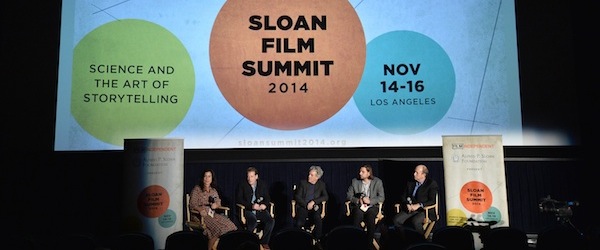Five Things that Blew My Mind at the Sloan Film Summit

Last weekend, Film Independent hosted the Sloan Film Summit, a triennial conference for the Alfred P. Sloan Foundation’s film program, which has partnered with Film Independent, among other artist development organizations and film schools, to support films exploring science and technology that are as accurate as they are entertaining.
The entire weekend was a celebration of science and the art of storytelling, and over 100 Sloan-supported artists were there to share and discuss their work with scientists, industry experts, representatives from the Sloan partner organizations and, of course, each other. We’ve recapped nearly every mind-blowing minute of the event, which included several presentations by some of the world’s top minds in mathematics, theoretical physics and even a renowned hacker, on the 2014 Sloan Film Summit website, but here are just five things from the Summit that blew my mind:
1. The incredible lives of Stephen Hawking and Alan Turing
The Summit opened Friday night with a screening of Stephen Hawking biopic The Theory of Everything and closed Sunday night with a special advance screening of Sloan-supported Alan Turing biopic The Imitation Game, which will hit theaters this weekend. The compelling drama of these men’s lives speaks to the truth at the heart of the Sloan Film Program: the world of science is full of fascinating characters, deeply human drama and wonderful stories just waiting to be told onscreen.
2. Scientists are artists, too
In addition to the Sloan Film Program’s major message that stories about science are complex and human and deserve to be told, I was repeatedly struck by the similarities between studying science and making art. The Theory of Everything stars Eddie Redmayne and Felicity Jones, who took part in a post screening Q&A alongside producer Lisa Bruce, who all agreed that working on the film taught them how truly creative the sciences are. As keynote speaker Beau Willimon (writer/showrunner, House of Cards) phrased it, “In a lot of ways, the pursuit of science and the pursuit of art are the same. It’s about observing the world around you, trying to make sense of it, trying to access something that’s bigger than yourself.”
3. And scientists are cool
Of course it’s always fun to listen to filmmakers talk about their work, but the scientists at the Summit who spoke about theirs were some of the coolest, smartest, funniest people I’ve ever heard. At the Science and Entertainment Exchange event Saturday night, where three artists presented original work—two short films and a musical theater piece—inspired by a scientist they were paired with, I was genuinely thrilled to listen to talks about the psychological implications of addiction, the program vulnerabilities that hackers exploit and the fundamentals of quantum physics. Two of the scientists there had previously advised Marvel on the scientific elements of superhero movies. Seriously, how cool is that?!
4. The poetry of science
As it was a weekend devoted to the intersection of science and art, it makes sense that I began to see the pursuit of scientific understanding as an absolutely poetic undertaking. At the Q&A after The Theory of Everything, when asked how his research benefits the rest of us, physicist David Kaplan said about his area of study: “You can ask any single human being, ‘what do you do to survive, and what do you do to thrive, and then, what inspires you—what do you aspire to?’ I like to think of this type of research as something that the human race is aspiring to.” A wonderfully romantic notion, I thought, to come up in casual conversation about physics.
5. The work of the Sloan Film Program
The Alfred P. Sloan Foundation is particularly well known for the incredible support it provides scientific research, and the Film Program is perhaps not so famous as some of the other branches of the organization, but it certainly should be. First thing Saturday morning, all of the Sloan grant recipients in attendance introduced themselves and described their films to all of the attendees, and the number and variety of interesting projects that have benefited from the Foundation’s support was truly incredible. Doron Weber, Vice President of Programs at the Alfred P. Sloan Foundation, pointed out that with The Theory of Everything, The Imitation Game and Interstellar all having major releases and getting significant awards-season buzz right now, these science-themed movies are emerging as an important trend in the film industry. The Sloan Foundation’s support has contributed to that immensely.
“The Sloan Foundation is extraordinary,” said Film Independent President Josh Welsh. “For narrative fiction film, there is no other organization that I’m aware of that provides this level of support to telling certain types of stories.”
Mind = blown.
Mary Sollosi / Film Independent Blogger
